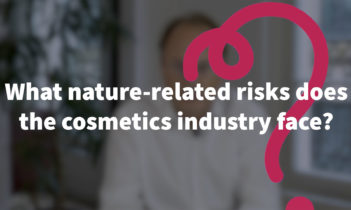by Laura Peano
2022 may mark a turning point, if action matches commitments.
First, the good news: A cadre of the world’s largest corporate plastic consumers reduced their virgin plastic consumption for the second year in a row — 1.2% between 2020 and 2019. According to the Ellen MacArthur Foundation (EMF), which leads the Global Commitment the group has signed onto, this downward trend may very well hold and plunge even further with the approach of ambitious 2025 targets.
That said, the EMF reported that their Global Commitment signatories need to move much more quickly than the current pace toward a circular economy focused on elimination and reuse. The World Wildlife Fund (WWF) estimates that the ecological, social and economic cost of plastic produced in 2019 alone topped US$3.7 trillion — more than the GDP of India. WWF analysts estimate that by 2040, the collective damage caused by plastics could total as much as US$7.1 trillion annually.
Motivation, knowledge and tools — business has practically all it needs to drive down consumption of plastics worldwide.
But it doesn’t have to turn out this way. A combination of stronger public policies, technological innovations, bold corporate leadership and activism can still make a massive dent in the plastics problem, and fast.
The corporate world made significant strides in 2021 toward getting organized for plastics action, with meaningful outputs from cross-sector collaborations and new resources that have the potential to significantly scale impact. Here’s how far the needle moved this past year and what lies ahead in 2022.
Eliminate, innovate, circulate
This year, companies stepped up their commitment to extended producer responsibility (EPR) schemes, a proven way to keep packaging “in the economy and out of the environment”. Over 150 businesses and other organizations, including Quantis, pledged their support of EPR schemes, which would require companies that use packaging to provide sufficient funding for collecting, sorting and recycling waste after use. “Without such policies, packaging collection and recycling is unlikely to be meaningfully scaled and tens of millions of tonnes of packaging will continue to end up in the environment every year,” warns the EMF.
Aligning on best practices for corporate plastic stewardship
Last February, Quantis, Verra, EA and South Pole introduced the 3RI Guidelines for Corporate Plastic Stewardship, the world’s first comprehensive framework to help companies verifiably manage and reduce their plastic footprint. The guidelines include plastic footprint assessment metrics, based on Quantis’ Plastic Leak Project Guidelines, mitigation activities inside and outside the value chain, and advice on corporate governance of plastics initiatives.
Sustainability gets baked into the design process
At Quantis, we launched eQopack, a new packaging tool developed for designers that assesses the environmental impact of packaging. Designers use eQopack to embed ecodesign principles into their packaging projects from the start.
Plastic pollution data goes global
Our partner EA – Environmental Action launched the PLASTEAX data platform to make quality plastic waste management and leakage data transparent and accessible. Based on the National Guidance for Plastic Pollution Hotspotting and Shaping Action, a methodology we developed with EA for the UN and other NGOs, PLASTEAX provides a solid foundation on which decision makers can take action and track progress based on best-available country-level and polymer data.
What to watch for in 2022
2022 promises to be even more eventful. We expect to see a number of milestones:
- In February 2022, at the next session of the UN Environment Assembly, delegates from all 193 member governments will gather to negotiate a treaty on plastics production, a measure that the EMF, WWF and others say is necessary to drive global action on plastics pollution. As they wrote in a recent report, “Plastic pollution is a global problem that requires a global solution.” The odds are good that these discussions will result in an actual treaty.
- Also in Q1 2022, the World Business Council for Sustainable Development will issue its Sustainable Packaging Framework as part of the circular sustainability assessment for packaging workstream, co-created with Quantis, EA and South Pole. This framework proposes a unique approach to sustainable packaging decision-making, supporting companies in navigating all aspects of the environmental impacts of packaging design. It will enable businesses to speak a common language across the value chain and drive greater credibility.
- In mid-2022, look for an update to the European Union Packaging Directive. We expect significant advances in package regulations, including a requirement that by 2030 all EU packaging will be reusable or recyclable. New rules are intended to expand the market for secondary raw materials with mandatory recycled content for packaging. A regulatory framework for biodegradable and bio-based plastics, and more measures on single-use plastics, is also expected.
- Plastic credits — specialized credits similar to the carbon credits model and focused on plastic waste clean-up — will become more popular, as companies look to offset their plastic use with the removal of plastic from the environment. Although they’re no substitute for actual reduction, they can help companies reach net-zero plastic leakage earlier than otherwise scheduled.
- In Q4 2022, public debate will open on an EU proposal to reduce microplastic pollution. The measures will be designed to reduce the presence of unintentionally released microplastics from tires, textiles, and plastic pellets, increase their labeling and regulation and encourage more research on the risks and occurrence of microplastics in the environment, tap water, and food.
- EPR schemes will catch on in countries in the Global North, so businesses should expect additional fees to fund the collection and processing of waste. In Asia and Africa, where the need for recycling infrastructure support is more urgent, businesses must take the initiative. If they wait for governments to act, it will be too late.
- More retailers are likely to follow Tesco’s lead in mandating strict criteria for product packaging. Businesses will also find themselves under increasing pressure to design for recyclability.
If action matches the level of commitment seen in 2021, we will soon be able to make considerable progress on containing the damage of this disaster.
Laura Peano is the global plastics and packaging lead at Quantis.
Related resources

What nature-related risks does the pharma industry face?
By protecting biodiversity and natural ecosystems, the pharmaceutical industry can mitigate risks and build long-term resilience.

World Cocoa Foundation publishes first ever greenhouse gas accounting standard for the cocoa sector
World Cocoa Foundation & Quantis launch first-ever GHG standard, helping the cocoa sector measure, report, and cut emissions consistently.

Accelerating decarbonization
Allon Zeitoun and Géraldine Noé sit down to discuss the progress made, challenges ahead and what companies can do to accelerate action to 2030


